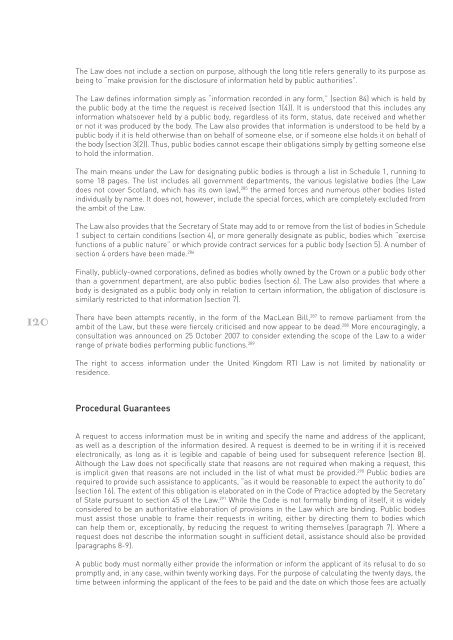Freedom of Information: A Comparative Legal Survey - Federation of ...
Freedom of Information: A Comparative Legal Survey - Federation of ...
Freedom of Information: A Comparative Legal Survey - Federation of ...
You also want an ePaper? Increase the reach of your titles
YUMPU automatically turns print PDFs into web optimized ePapers that Google loves.
120<br />
The Law does not include a section on purpose, although the long title refers generally to its purpose as<br />
being to “make provision for the disclosure <strong>of</strong> information held by public authorities”.<br />
The Law defi nes information simply as “information recorded in any form,” (section 84) which is held by<br />
the public body at the time the request is received (section 1(4)). It is understood that this includes any<br />
information whatsoever held by a public body, regardless <strong>of</strong> its form, status, date received and whether<br />
or not it was produced by the body. The Law also provides that information is understood to be held by a<br />
public body if it is held otherwise than on behalf <strong>of</strong> someone else, or if someone else holds it on behalf <strong>of</strong><br />
the body (section 3(2)). Thus, public bodies cannot escape their obligations simply by getting someone else<br />
to hold the information.<br />
The main means under the Law for designating public bodies is through a list in Schedule 1, running to<br />
some 18 pages. The list includes all government departments, the various legislative bodies (the Law<br />
does not cover Scotland, which has its own law), 285 the armed forces and numerous other bodies listed<br />
individually by name. It does not, however, include the special forces, which are completely excluded from<br />
the ambit <strong>of</strong> the Law.<br />
The Law also provides that the Secretary <strong>of</strong> State may add to or remove from the list <strong>of</strong> bodies in Schedule<br />
1 subject to certain conditions (section 4), or more generally designate as public, bodies which “exercise<br />
functions <strong>of</strong> a public nature” or which provide contract services for a public body (section 5). A number <strong>of</strong><br />
section 4 orders have been made. 286<br />
Finally, publicly-owned corporations, defi ned as bodies wholly owned by the Crown or a public body other<br />
than a government department, are also public bodies (section 6). The Law also provides that where a<br />
body is designated as a public body only in relation to certain information, the obligation <strong>of</strong> disclosure is<br />
similarly restricted to that information (section 7).<br />
There have been attempts recently, in the form <strong>of</strong> the MacLean Bill, 287 to remove parliament from the<br />
ambit <strong>of</strong> the Law, but these were fi ercely criticised and now appear to be dead. 288 More encouragingly, a<br />
consultation was announced on 25 October 2007 to consider extending the scope <strong>of</strong> the Law to a wider<br />
range <strong>of</strong> private bodies performing public functions. 289<br />
The right to access information under the United Kingdom RTI Law is not limited by nationality or<br />
residence.<br />
Procedural Guarantees<br />
A request to access information must be in writing and specify the name and address <strong>of</strong> the applicant,<br />
as well as a description <strong>of</strong> the information desired. A request is deemed to be in writing if it is received<br />
electronically, as long as it is legible and capable <strong>of</strong> being used for subsequent reference (section 8).<br />
Although the Law does not specifi cally state that reasons are not required when making a request, this<br />
is implicit given that reasons are not included in the list <strong>of</strong> what must be provided. 290 Public bodies are<br />
required to provide such assistance to applicants, “as it would be reasonable to expect the authority to do”<br />
(section 16). The extent <strong>of</strong> this obligation is elaborated on in the Code <strong>of</strong> Practice adopted by the Secretary<br />
<strong>of</strong> State pursuant to section 45 <strong>of</strong> the Law. 291 While the Code is not formally binding <strong>of</strong> itself, it is widely<br />
considered to be an authoritative elaboration <strong>of</strong> provisions in the Law which are binding. Public bodies<br />
must assist those unable to frame their requests in writing, either by directing them to bodies which<br />
can help them or, exceptionally, by reducing the request to writing themselves (paragraph 7). Where a<br />
request does not describe the information sought in suffi cient detail, assistance should also be provided<br />
(paragraphs 8-9).<br />
A public body must normally either provide the information or inform the applicant <strong>of</strong> its refusal to do so<br />
promptly and, in any case, within twenty working days. For the purpose <strong>of</strong> calculating the twenty days, the<br />
time between informing the applicant <strong>of</strong> the fees to be paid and the date on which those fees are actually
















